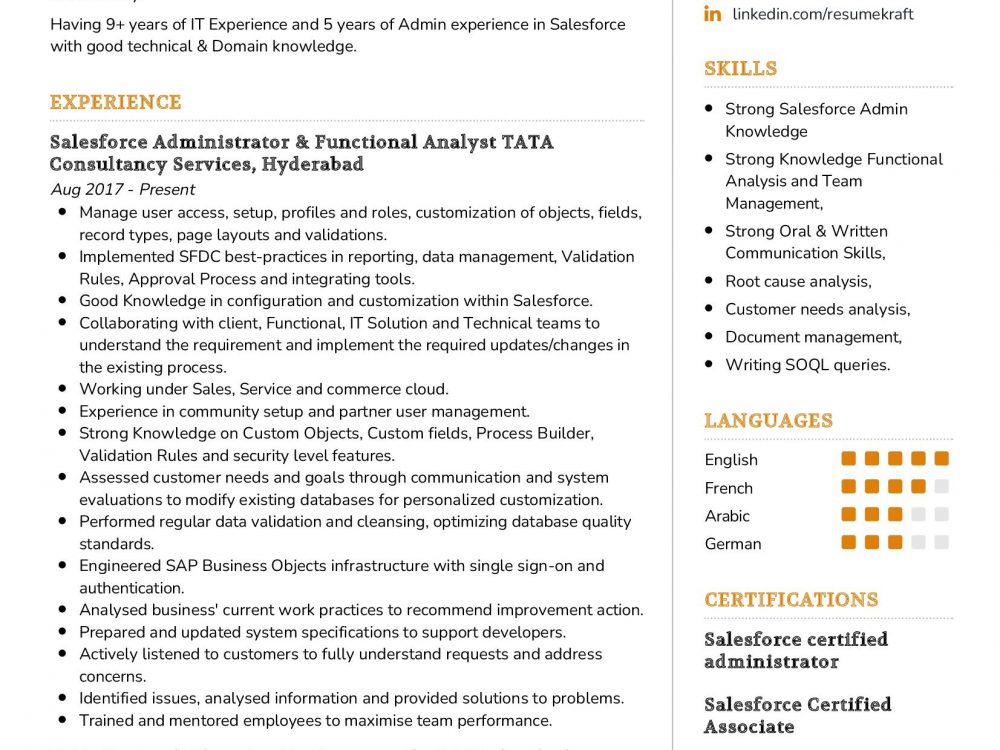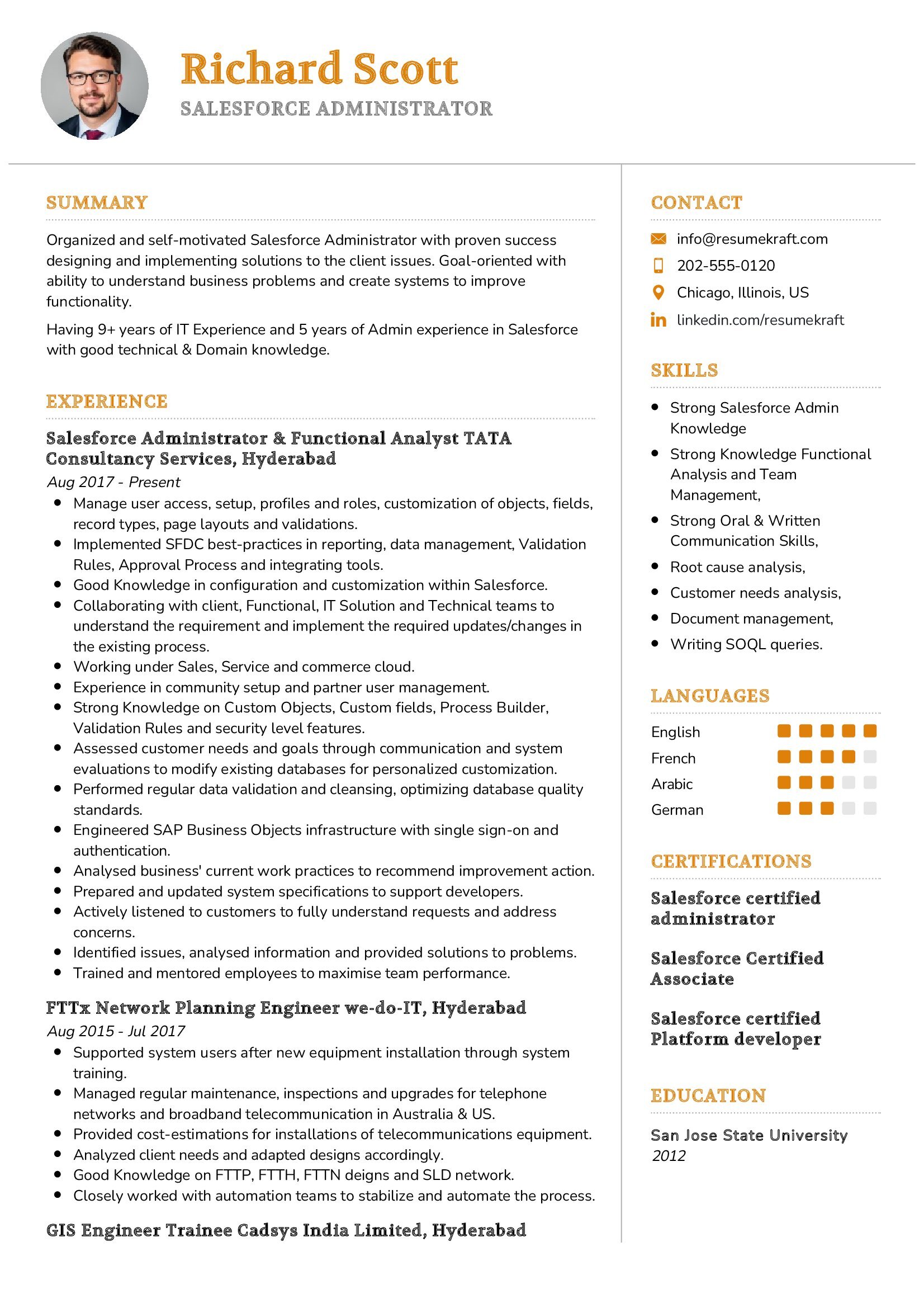The Role and Responsibilities of a Salesforce Administrator
In today’s digital-driven business landscape, Salesforce has emerged as a vital tool for organizations seeking to streamline their customer relationship management (CRM) processes. Central to the effective utilization of Salesforce is the role of a Salesforce Administrator. This role combines technical expertise with a deep understanding of the organization’s needs, ensuring that Salesforce operates at its full potential to support sales, marketing, and customer service efforts. In this comprehensive guide, we will delve into the multifaceted role of a Salesforce Administrator, explore the job requirements, responsibilities, and provide valuable insights to help you excel in this crucial position.
Job Requirements for a Salesforce Administrator
Transitioning into the role of a Salesforce Administrator demands meeting specific requirements and acquiring a diverse skill set. Let’s explore the prerequisites for becoming a proficient Salesforce Administrator:
- Educational Background: A Bachelor’s degree in a relevant field, such as Computer Science, Business Administration, or Information Technology, can provide a strong foundation for this role.
- Salesforce Certification: Salesforce offers various certifications, including Salesforce Administrator Certification, which is highly recommended. These certifications demonstrate your expertise in Salesforce and its functionalities.
- Technical Proficiency: A solid understanding of Salesforce’s technical aspects, including data management, security, automation, and customization, is crucial. Proficiency in Salesforce tools like Salesforce Lightning and Salesforce Classic is essential.
- Problem-Solving Skills: Salesforce Administrators often encounter complex challenges that require creative problem-solving. Developing strong analytical and troubleshooting skills is essential.
- Communication Skills: Effective communication is key when working with various teams, including sales, marketing, and IT. Salesforce Administrators must convey technical information in a clear and understandable manner.
- Adaptability: The Salesforce ecosystem evolves rapidly. Administrators should stay up-to-date with the latest features and best practices to ensure Salesforce is leveraged effectively.
Attaining Salesforce certifications and continuously enhancing your skills are essential steps in preparing for the role of a Salesforce Administrator.
Responsibilities of a Salesforce Administrator
The role of a Salesforce Administrator is diverse and dynamic, encompassing a range of responsibilities that are central to an organization’s success with Salesforce. Here are the core responsibilities of a Salesforce Administrator:
- System Configuration: Salesforce Administrators customize and configure Salesforce to align with the organization’s specific needs. This includes creating custom fields, objects, and workflows to automate processes.
- Data Management: They ensure the integrity and quality of data within Salesforce by implementing data validation rules, cleaning and importing data, and establishing data security measures.
- User Training and Support: Salesforce Administrators provide training to users on how to effectively use Salesforce, troubleshoot issues, and offer ongoing support to address user concerns.
- Report and Dashboard Creation: They generate reports and dashboards to provide insights into sales, marketing, and customer service performance. These insights help in making data-driven decisions.
- Automation and Workflow: Salesforce Administrators design and implement automated processes and workflows, such as lead assignment rules and email alerts, to streamline operations and improve efficiency.
- Security Management: They oversee security settings, roles, and permissions within Salesforce to protect sensitive data and ensure compliance with data privacy regulations.
- Integration: Salesforce Administrators collaborate with other teams to integrate Salesforce with other business systems and applications, ensuring seamless data flow.
The effectiveness of a Salesforce Administrator directly impacts an organization’s ability to manage customer relationships, drive sales, and make informed decisions.
Creating a Strong Salesforce Administrator Resume
Your resume is your gateway to landing a Salesforce Administrator role. To craft a standout resume, consider the following tips:
- Highlight Salesforce Experience: Emphasize your experience with Salesforce, including specific projects you’ve worked on and the impact you’ve had on your previous organizations.
- Quantify Achievements: Use metrics to quantify your achievements. For example, mention how you improved data accuracy by a certain percentage or increased user adoption rates.
- Soft Skills: Highlight soft skills such as problem-solving, communication, and teamwork, as these are valuable in a Salesforce Administrator role.
- Certifications: List your Salesforce certifications prominently to showcase your expertise.
- Tailor Your Resume: Customize your resume for each job application by aligning your skills and experiences with the specific requirements of the role.
Your resume should convey your ability to effectively manage Salesforce and drive positive outcomes for your future employer.
Salesforce Administrator Resume Summary Examples
Your resume summary is the opening statement that introduces you to potential employers. Craft a compelling summary to capture their attention:
- “Seasoned Salesforce Administrator with a track record of optimizing CRM processes, increasing sales team productivity by 25%, and ensuring data accuracy through meticulous data management.”
- “Certified Salesforce Administrator skilled in customizing Salesforce to align with organizational goals, with a proven ability to develop and implement automation workflows that drive efficiency.”
- “Experienced Salesforce Administrator with expertise in user training, data security, and report generation. Committed to enhancing customer relationship management through Salesforce excellence.”
Your resume summary should provide a glimpse of your capabilities and what you bring to the table as a Salesforce Administrator.
Education Section for Your Salesforce Administrator Resume
Your education section showcases your academic background and relevant certifications. Here’s how to structure it:
- Bachelor of Science in Business Administration, XYZ University, 2016.
- Salesforce Certified Administrator, Salesforce.com, 2017.
- Master’s in Information Technology, ABC University, 2020.
Your educational qualifications, especially Salesforce certifications, validate your expertise as a Salesforce Administrator.
Salesforce Administrator Skills for Your Resume
Your skill set as a Salesforce Administrator plays a pivotal role in your success. Here are the essential skills to highlight:
Technical Skills:
- Proficiency in Salesforce CRM.
- Data management and data quality assurance.
- Workflow automation and process optimization.
- Report and dashboard creation.
- Integration with third-party applications.
Soft Skills:
- Strong problem-solving abilities.
- Effective communication and training skills.
- Attention to detail.
- Adaptability to new Salesforce features.
- Collaboration and teamwork.
These skills collectively enable you to excel in your role as a Salesforce Administrator.
Common Mistakes to Avoid in Your Salesforce Administrator Resume
When creating your Salesforce Administrator resume, steer clear of these common mistakes:
- Generic Resumes: Avoid using a one-size-fits-all resume. Tailor your resume for each job application.
- Lack of Quantification: Don’t forget to quantify your achievements and the impact you’ve had on previous organizations.
- Ignoring Soft Skills: Highlight soft skills, as they are crucial for effective communication and collaboration in this role.
- Outdated Information: Keep your resume up-to-date with your latest certifications and experiences.
- Spelling and Grammar Errors: Proofread your resume to ensure it is error-free.
Avoiding these mistakes will help your resume stand out to potential employers.
Key Takeaways for Your Salesforce Administrator Resume
As we conclude this guide, remember these key takeaways when crafting your Salesforce Administrator resume:
- Highlight your Salesforce expertise and specific achievements.
- Use metrics to quantify your impact.
- Showcase soft skills that are essential for effective communication and teamwork.
- Customize your resume for each job application.
Your resume should reflect your ability to harness Salesforce to drive success in your next role as a Salesforce Administrator.
Finally, feel free to utilize resources like AI Resume Builder, Resume Design, Resume Samples, Resume Examples, Resume Skills, Resume Help, Resume Synonyms, and Job Responsibilities to create a standout application and prepare for the Salesforce Administrator job interview.


